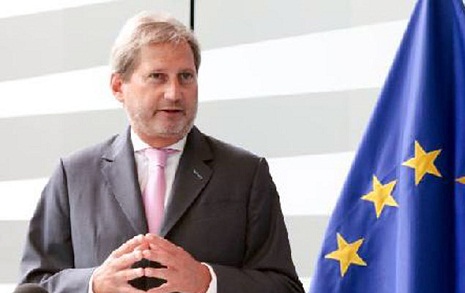Johannes Hahn: Status quo in Nagorno-Karabakh conflict is unsustainable, political solution is needed

- EU launched a consultation on policy toward its neighbors. Will be there any changes in relation to Azerbaijan in new European Neighborhood Policy?
- Our objectives with the consultation are to reach the full potential of our relationship with partners in the region including Azerbaijan. We have to adapt the neighborhood policy to changed circumstances, changing aspirations and new challenges. We need to ensure that the ENP can, in future, support more effectively the development of Azerbaijan`s and the EU`s shared stability, security and prosperity. As a result, an effective ENP would be closely integrated into an overall EU Foreign Policy with a comprehensive approach using all instruments both of the EU and of Member States.
- What does Azerbaijan mean for the European Union? Why Azerbaijan is important in “Eastern partnership” program?
- Azerbaijan is an important partner for the EU. Azerbaijan is a core member of the Eastern Partnership which is the framework for the European Union`s relations with its eastern neighbors. Since 2009, under the Eastern Partnership we have established a dense network of relations at all levels and significantly strengthened our sectoral cooperation in areas such as mobility, economic cooperation and energy security.
- Azerbaijan announced its readiness for signing a juridical document on strategic partnership, noting that it is not interesting in an association agreement. What is the position of EU on it?
- We have taken note of Azerbaijan`s position and await a proposal from the Azerbaijani side. The EU wants to update and deepen its relations with Azerbaijan beyond the scope of the present Partnership and Cooperation Agreement of 1999.
- Azerbaijan criticizes the selective position of EU on unresolved conflicts; we saw it in the issue of Crimea. We think that relation to the countries which lands are occupied and which is aggressor don’t have to be the same?
- The EU supports the peaceful settlement of conflicts in accordance with international law and through negotiations in relevant formats. The EU does not recognize the annexation of Ukraine`s Crimea by Russia on 21 March 2014. The EU does not recognize Nagorno-Karabakh, neither does any country including Armenia.
Stability in the South Caucasus cannot be achieved without a lasting resolution of the Nagorno-Karabakh conflict. The status quo is unsustainable, a political solution is needed. Violence and tit-for-tat action on the ground, and confrontational rhetoric do not contribute to peace. The EU has consistently called on the sides to exercise restraint on action and in words. This would help creating an environment conducive to progress in the peace process facilitated by the Minsk Group.
- Azerbaijan deputy foreign minister Mahmud Mammadguliev stated that a visa-free regime between Azerbaijan and the European Union likely to be applied after a few years. What is the position of EU on it?
- The Visa Facilitation and Readmission Agreements entered into force on 1 September 2014 between the EU and Azerbaijan. We also launched a mobility partnership between the EU Member States and Azerbaijan in December 2013. The EU is looking at how we can further advance our cooperation in the field of mobility, drawing on our experience in implementing these agreements.
- What is the position of EU regarding the accession of some Eastern Partnership countries to Eurasia Union?
- Eastern Partnership members are naturally free to choose their own path when it comes to other forms of regional integration, as long as these are compatible with existing international commitments.
/apa/














































